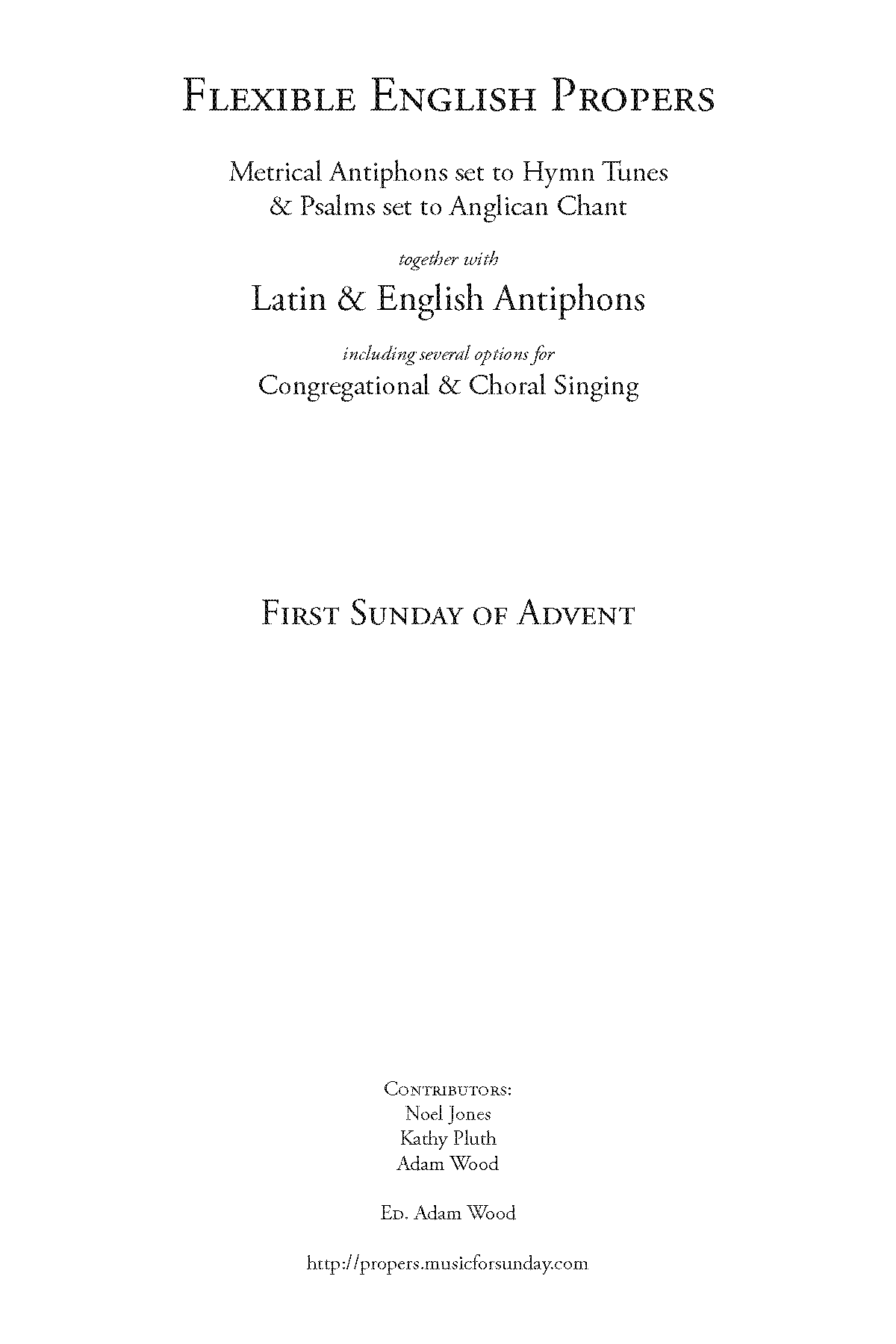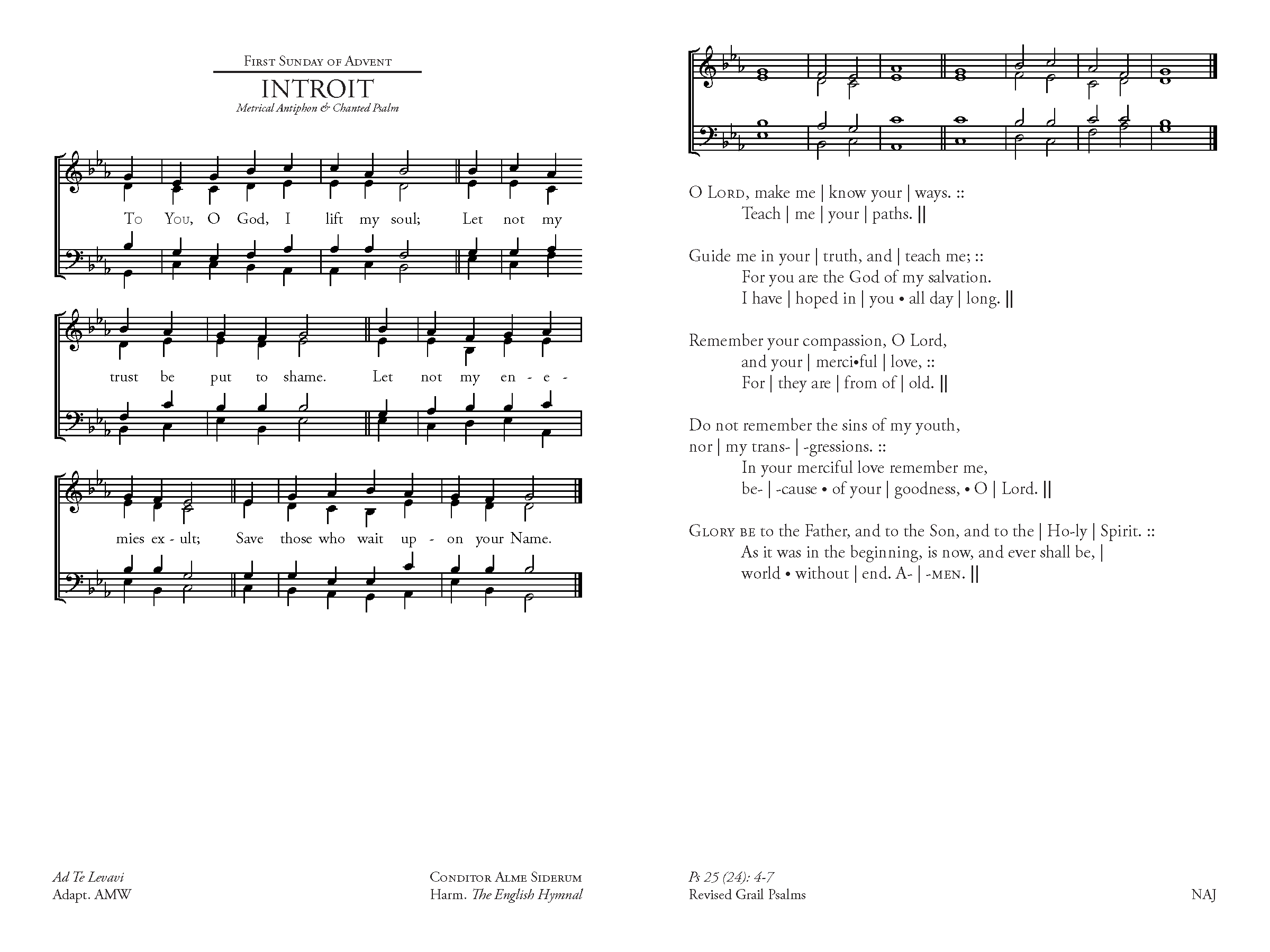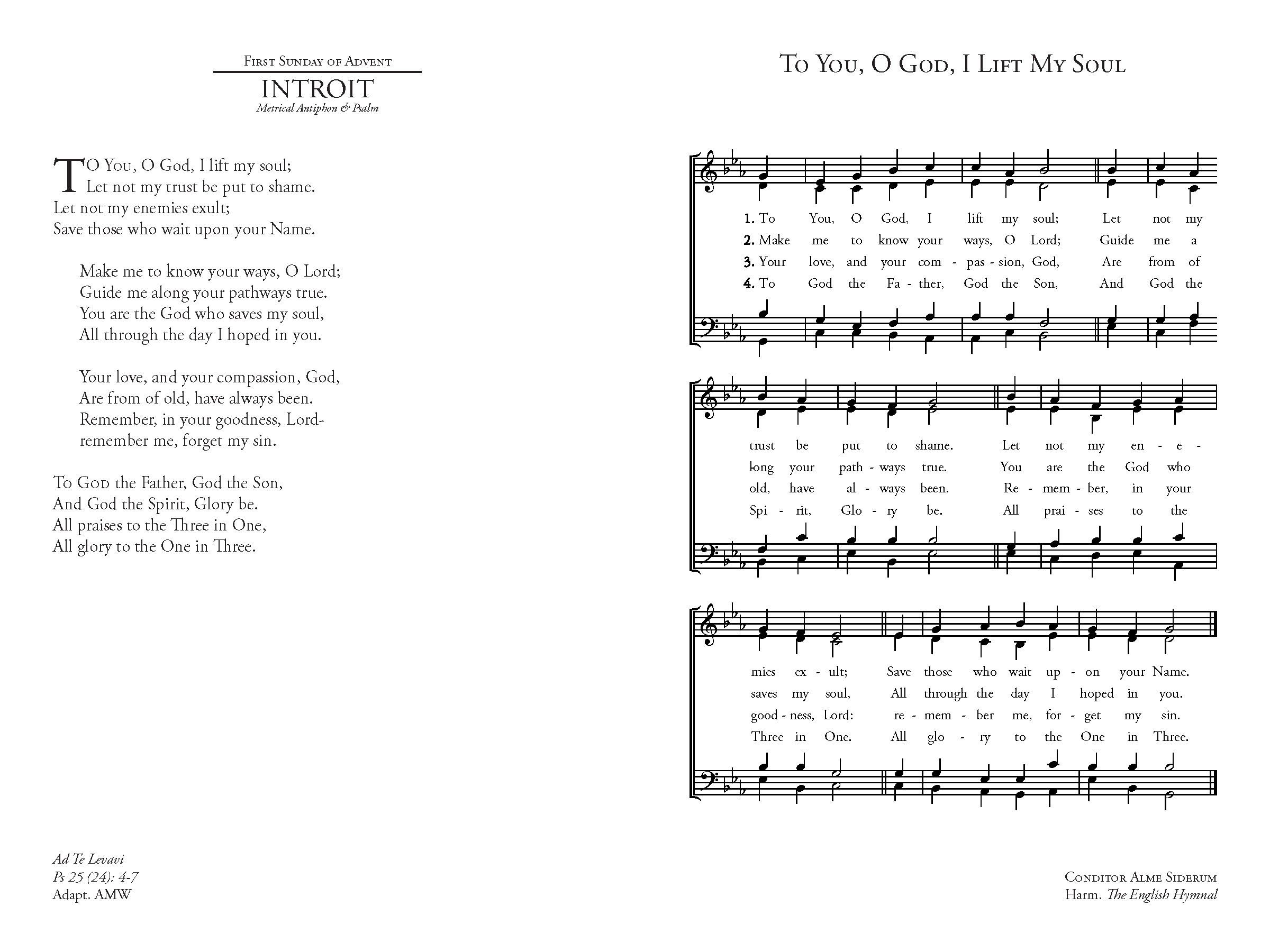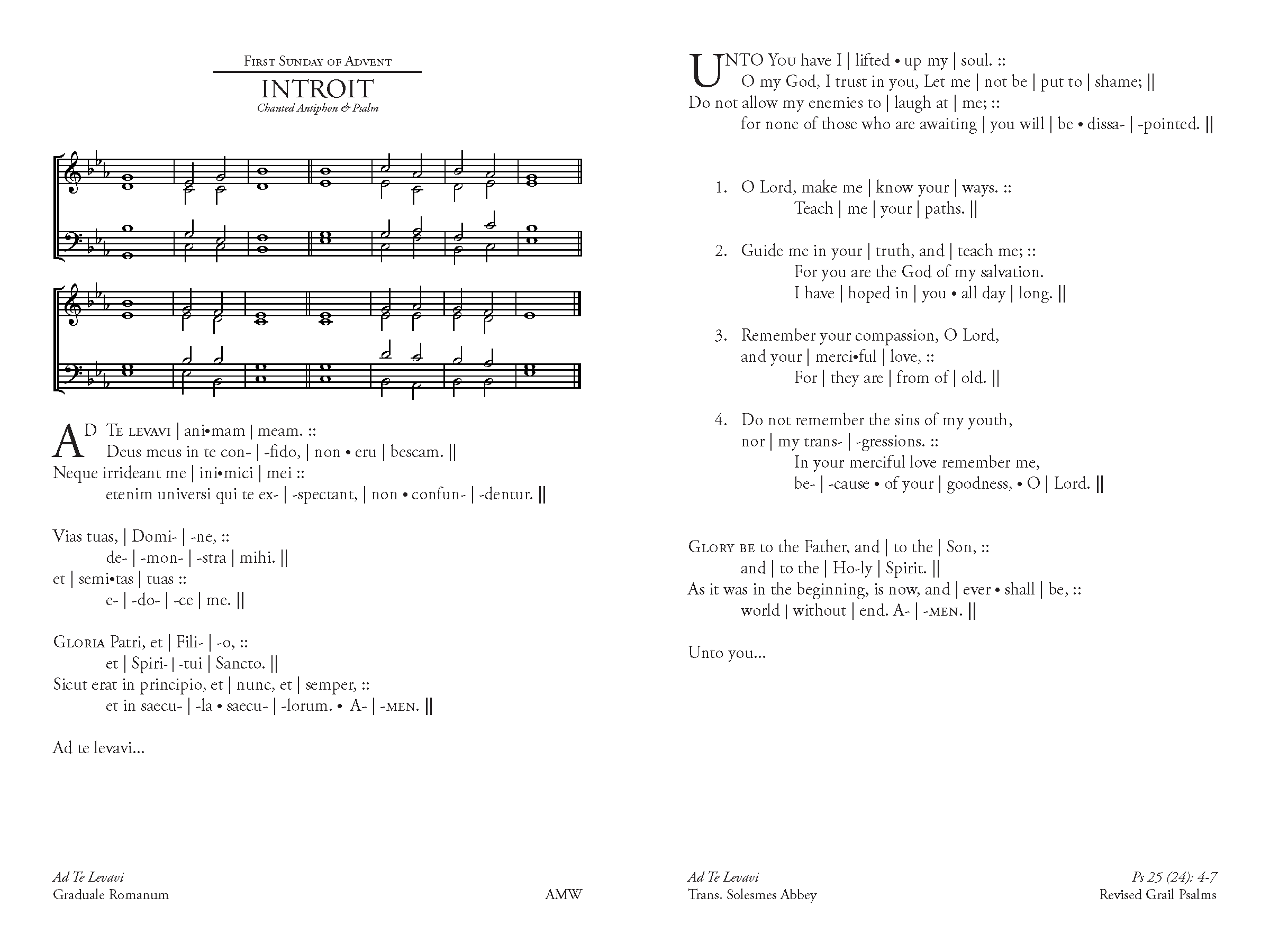World Famous Blogger interviews little-known composer and publisher
-
World Famous (citation || citation) blogger Adam Wood interviews soon-to-be-famous music publisher Adam Wood about an exciting new Propers project!
- So what's the name of your new project?
- Well- that's a bit of a problem right at the moment.
- I am tentatively calling it the "Flexible English Propers."
- But I've gotten some negative feedback on that from people I trust- so I'm still a little unsure what the final title is.
- Another possibility is "Hymn and Chant Propers"
- I'm hoping that the community at Musica Sacra and Chant Cafe will weigh in on the name and help me settle this.
- Could you describe the project a little bit?
- The idea is to provide a handful of easy ways to sing the Proper Introit, Offertory, and Communion chants in English, Latin, or a combination of both.
- Each of the three texts has been paraphrased in a metrical hymn, and set to a hymn tune. The Psalm verses (and the Gloria Patri) are set to an Anglican Chant tone that matches the hymn tune, so that the Hymn Antiphon and the Chanted Psalms can be sung together.
- Additionally, a second Anglican Chant tone (a Double Chant) is provided, for those who want to use the actual text of the Antiphons instead of a metrical paraphrase. This can be sung in Latin or English (or both together).
- Finally, for the Introits only, I have provided an entire 4-verse hymn. The Antiphon, the Psalm verses, and the Doxology are all set in a metrical hymn text and paired with a familiar tune.
- Sounds like you are providing a lot of options.
- Yes. That's why I'm leaning toward the name "Flexible English Propers."
- Each one of the Mass Propers can be done a handful of ways, and you could do each one of them differently in a single Mass.
- Where did you get the idea for this project?
- Well, to start with, I think most Catholic composers have an "I should do a cycle of Propers" project in the back of their minds.
- Christopher Tietze's Introit Hymns and the Simple English Propers project both served as inspiration and potential models for embarking on such a project, and the relative success of both (particularly the SEP) showed that there was certainly a "market need."
- Then one day I started writing Metrical hymn text versions of the Introit Antiphons in a bit of a fit of inspiration. I posted several Introit Hymns for Advent on the Musica Sacra board. Kathy Pluth suggested an idea she had been toying with- pairing metrical antiphons with chanted psalms. That sounded like a good idea, so I threw together an Antiphon set to BRESLAU (an Advent hymn I found in the The Episcopal Hymnal 1940), along with an Anglican Chant tone I got from the Cathedral Psalter, just as an experiment. I loved it, so I thought others might too.
- I contacted Kathy (since it was basically her idea) and Noel Jones (because he knows a lot more about Anglican Chant than I do) to see if either of them were interested in pursuing a complete project. Kathy said she could be only minimally involved, but that I was free to use any of the metrical settings she was working on. Noel had a bit more time to volunteer, and he has ended up providing most of the Anglican Chant tones. Both of them have been very enthusiastic and supportive- offering a number of suggestions, critiques, and general cheerleading. I'm hoping that both of them, and maybe some others, will continue to be involved as this porject settles into the long-haul trek of making it through the whole year's cycle.
- How did you select which hymn tunes to use?
- The Introits are set to well known or quickly-learnable hymns. Some of these are Catholic chant hymns (Conditor Alme Siderum), others are solid Protestant-origin tunes that have made it into common use in Catholic parishes (Old Hundredth), and a few are less-well known tunes that are nonetheless easy to quickly pickup (Breslau).
- The Offertory and the Communions are all set to a fixed number of Gregorian Chant hymns, mostly from the Divine Office. I selected two tunes in each of the eight Gregorian Modes (one for Offertory and one for Communion). These are then paired with the text each week to match the Mode of the Gregorian originals. (An idea borrowed from Adam Bartlett's SEP). This provides some variety and continuity at the same time, and also exposes choirs and congregations to the wonderful treasures of Gregorian Hymnody.
- Why Anglican chant? Why not plainchant psalm tones?
- For one thing, the Simple English Propers have covered that territory way better than I could ever hope to. Moreover, the choral aspect of Anglican-style chanting seems to pair better with congregational hymn-singing.
- Besides the SEP and Christopher Tietze's work, there seems to be a lot of Propers projects popping up, including a few that seem very close to yours. Does that worry you? Do you feel like the competition is ramping up?
- If I was worried that someone else would do a better job at writing propers, there'd be no way to start. Nobody can compete with the perfection of the Gregorian originals, or with the directness of Adam Bartlett's SEP. I certainly can't compete with Kathy Pluth's ability to rhyme-and-meter just about anything she sets her sights to.
- I'm simply hoping that at least a few parishes find this project useful. I'm especially hoping that some parish, somewhere, that wouldn't use the Proper texts otherwise, uses this to introduce the propers to their liturgy.
- Why did you decide to release it under a Creative Commons license? Don't you want to protect your work from people stealing it?
- Actually I'm hoping people steal it.
- The project wouldn't be possible without the Creative Commons, Public Domain, and free licensing.
- Most of the tunes and harmonizations aren't mine, they come from a Public Domain hymnal from England. The prose English translations of the Antiphons aren't mine, they come from Solesmes, and are licensed in the Creative Commons. Kathy's material was released to the Commons. Some of the Anglican Chant tones came from a Public Domain Psalter. The Psalm translations (Revised Grail), which are under a copyright from Conception Abbey (administered by GIA) were licensed for use for free. Even the basic idea for the layout (and the font choice!) was "stolen" from the Simple English Propers. And of course the source material, the Psalms and the Antiphons from the Graduale Romanum, are ancient and belong to all of us.
- So it's hard to claim ownership rights over a project like this. The most I might be able to say about it is that is mine, but not mine alone.
- Finally- where can we learn more about this project?
- Go to http://propers.musicforsunday.com
- You can see the latest versions, and sign up for an email newsletter, which will provide news on progress and also give you early access to Sunday editions of the Propers.
Click the Title Page to Download entire PDF.
Click the images below to see individual spreads.
-
I think most Catholic composers have an "I should do a cycle of Propers" project in the back of their minds.
I have no idea what most Catholic composers, or non-Catholic composers have synapsing in their brains. I do know that seven years ago, after having both the Graduale Romanum, the Rossini Propers, the Liber and all sorts of tomes on my library shelves for decades, when I finally had the concept of the propers coalesce in my mind, the last thing I would have said to myself, I should "do" the cycle of propers. Having some familiarity with the Rossini, the first thing I thought was "I need to immerse myself in the Gregorian settings." "How many years left on the planet do I have?" might have been the second thought.
I only bring this differing perspective up because I know that this "Catholic composer" never proceeds further than a concept unless the muse informs him that something new, not borrowed and blue, will be brought into the equation which, if only for him, has some great measure of "stand alone" innovation or genius with which to grace a text.
And I'm sure that you, the composer, decided that criterium for yourself with this project. May your road rise up to join the other roads that lead to the restoration of the use of propers at Mass. -
Nice title... "World Famous", eh?
-
I only meant that there's a handful of "bucket list" compositional projects I think most Catholic composers have:
-Missa Cantata
-Requiem
-Te Deum
etc...
Is that just me?
I certainly didn't embark on this because I've always wanted to get rich and famous writing Mass propers.
I just mentioned that, in a can't-help-myself-from-daydreaming sort of way, the idea had occurred to me and (I assume) has occurred to most of us.
As for this project in particular, Kathy's idea (hymn + chant verses) sparked an experiment that turned into a "this is a great idea!" feeling I didn't think I should ignore.
Moreover- this project relies much more on my organizational and design skills than on my musical ones.
This is an editorial project, not a compositional one.
At any rate- I hope it is useful.
And if it can't be useful, I plan to enjoy the heck out of putting it together. -
Nice title... "World Famous", eh?
Clicks and giggles. That's all I was hoping for. -
"Clicks and giggles"? You wise guy!
I know, Adam, just messin' with ya.
I'll fess up to the TE DEUM.
I have a number of Masses under the belt, and BION, they've actually been cantata'd!
The REQUIEM ? Well, I conducted the greatest non-chant version IMO this last May. Bucket checkout there. Plus the Faure, Durufle and Rutter (Verdi? Don't ask.)
The one for me after I've kicked the bucket: in the Missal.
Blessings,
Grumpy Grampy (my new moniker, per your collaborator) -
ha ha ha! great interview!
-
Adam... how well do really know this composer?
-
P. T. Barnum would be proud.
Good luck with the project. -
Penetrating! Lucid!
Welcome to the MusicaSacra Forum!
To participate in the discussions on Catholic church music, sign in or register as a forum member, The forum is a project of the Church Music Association of America.
Categories
- All Discussions21,238
- General Music Discussion8,275
- Job Openings210
- Management of Music Programs851
- Choral Matters534
- Church Documents and Rubrics528
- CMAA Notes304
- Events729
- For Newcomers: Read First26
- Sacred Polyphony547
- Hymnody875
- Gregorian Chant: General2,706
- ↳ Graduale Romanum and Liber Usualis369
- ↳ Graduale Simplex60
- ↳ Semiology63
- Vernacular Plainsong697
- Anglican Use and Anglican Chant68
- Organ, Other Instruments and Repertoire437
- New Composition/Works in Progress1,302
- Recordings234
- Music for Hispanic Ministry159
- Music Education: Children213
- Music Education: General222
- News Items245
- Positions Wanted3
- General Discussion: Catholicism740
- Amusements178
- General Discussion1,036
- Opinions119







